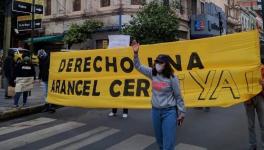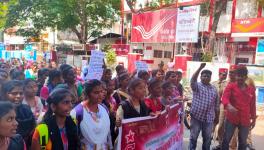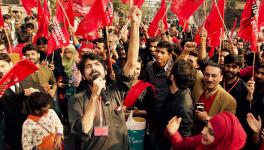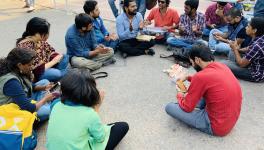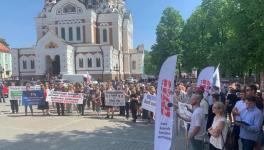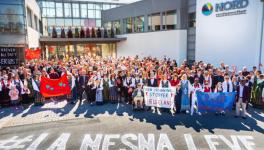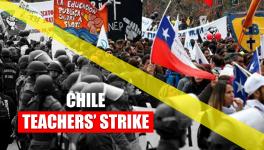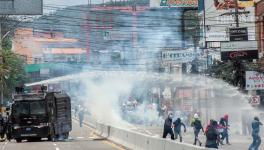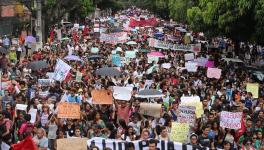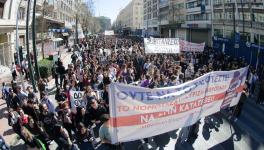‘The State Must Fund Universities to Check Interference of Private Capital in Campus Spaces’
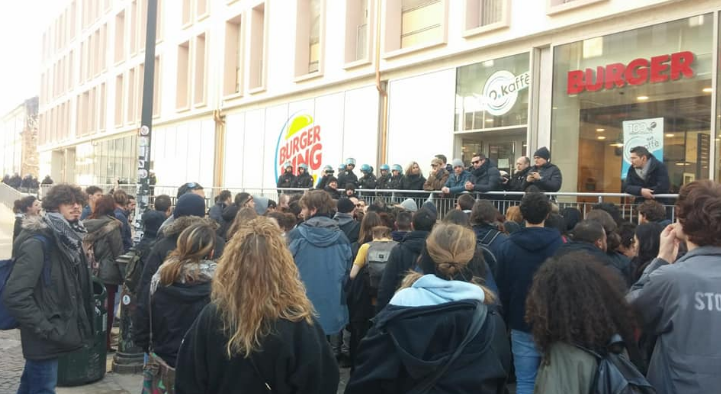
Students protesting multinational fast-food outlets at the University of Turin (Photo: Noi Restiamo Torino/ Facebook)
Students at the University of Turin, in Italy, are protesting the opening of outlets of multinational companies, such as Burger King and McDonald’s, on their campus. Students from various universities in Italy marched on February 7, expressing solidarity with students at the University of Turin. On February 14, another protest was held. Peoples Dispatch spoke to the Turin committee of the the activist group, Noi Restiamo, which is in the forefront of the students’ protests against the privatization of the campus spaces.
Noi Restiamo (which is Italian for ‘We Remain’) is a political organization of students and young workers in Italy which operates with a Marxist method of analysis and political praxis. Noi Restiamo is involved in campaigns against the surge in fascism, racist attacks, unemployment and the neoliberal onslaughts on the rights of students, youth and workers.
Peoples Dispatch (PD): How did the outlets of multinationals like Burger King and McDonald’s enter the University of Turin?
Noi Restiamo (NR): The multinationals are able to enter the campus thanks to an agreement, signed nine years ago, by the university regarding financing a construction project. The agreement gives permission to the private society, USP (University Service Project), to build on land belonging to the university. The “university” building built by USP will be administered by the company for 29 years. USP spent 50 million euros on the construction, and the University of Turin will pay 1.5 million euros annually, for 29 years, to use the space on the second floor for rooms and offices of the university. The first floor is leased by USP to commercial entities. In this case, Burger King is the first to establish its outlet, but the building is still under construction and in future, Starbucks and other big corporations may also set up outlets. The McDonald’s outlet, on the other hand, was opened a few meters from the university in a building which used to be a study hall. The building was initially planned to be a university residence and, so, no one questioned its construction.
PD: What are the major concerns raised by the students regarding the opening of these outlets?
NR: There was a spontaneous sense of indignation among the students when they saw the signs of the outlets, just before the end of 2018. The indignation was for three main reasons: the kind of corporations involved (promoters of junk food, who exploit workers and the environment), the critical need for space and services for students in our city, and the total transformation of our public university into a shopping mall. In the middle of the exam session, amid a chronic absence of space to study as well as canteens or places where students could eat, this move was unacceptable for students. It is also important to note that many humanities faculties do not have the space to hold lessons, and have to shift from one classroom to another. Due to all these factors, people refused to accept this decision and took to the streets. Among the protesters, there is a consciousness that these problems derive from national policies, which have since decades worked to transform the education sector into something integrated with the interests of private firms, profit-oriented, elitist and classist forces. This is a larger European tendency. The protest demands a university which is public, free from private interests, with more funding and with free access to students.
PD: What was the students’ response to such an intrusion and what are your future plans of agitation?
NR: The political organization, Noi Restiamo, called for a flash mob in front of Burger King, and for reading books inside, indicating that the space is for study, instead of a multinational outlet. Hundreds of students participated, but the police was also there, who tried to restrict the protest. After that, the students paraded to talk with the Rector. But, in front of the building where his office was, police manhandled the protesters for no reason. Agitated by this, the students decided to continue protesting, and today we are in the fourth week of protests. Last week, following a national level call, students from various universities marched in solidarity with us in different parts of the country.
PD: Is it just a local issue, confined to the University of Turin? Or are there any similar events, of corporate occupation of campus spaces, taking place in Italy? If so, what do you think is the reason behind it?
NR: In an explicit way, it is not a local issue. The private capital is advancing every day into more university spaces in the country. Since decades of cuts in public funds, and the reforms permitting private finance, we are witnessing a process in which private finance is pumped into public universities to orient R&D (research and development) programs and other programs of study. It is a general process, stimulated by national policies and the dictates of the European Union. The process was accelerated after the beginning of crisis in 2008, with the excuse of public debt problems and the imposition of austerity policies. The public universities do not have enough money to pay wages, or finance new buildings and researches, so they become vulnerable to private funds. But private funds are only available to some universities. So, we have two sets of universities in the country, a set of universities with regular private and public funds, and another set of universities which are constantly de-financed and can hardly offer enough service to the students.
PD: What is your take on the current Italian government’s policy on education?
NR: This government, even with its self-declared policy of “change”, continues to impose the policies of the preceding governments and the programs of the European Union. It continues to cut public funds for education, pursuing the concentration of big investment in the little pole of “excellence”, rather than equal distribution of funds, and favoring private funding of universities. So, our fight is mainly against the government’s policies. We want a university free from private interests, and accessible to students from all sections of the society.
Get the latest reports & analysis with people's perspective on Protests, movements & deep analytical videos, discussions of the current affairs in your Telegram app. Subscribe to NewsClick's Telegram channel & get Real-Time updates on stories, as they get published on our website.









